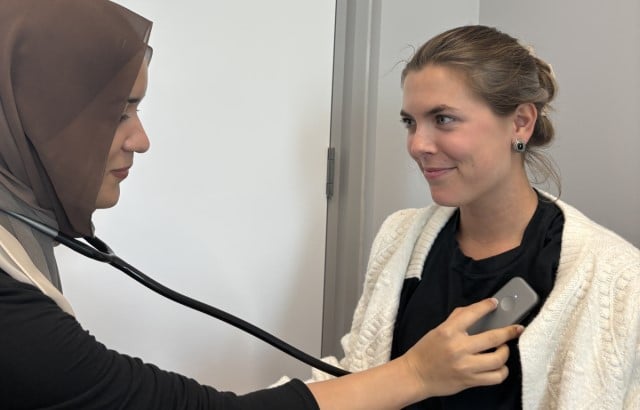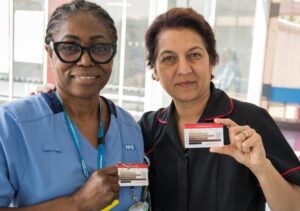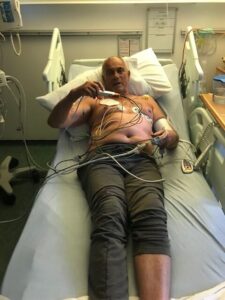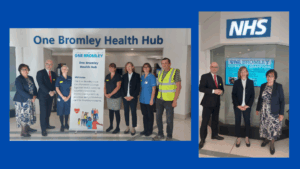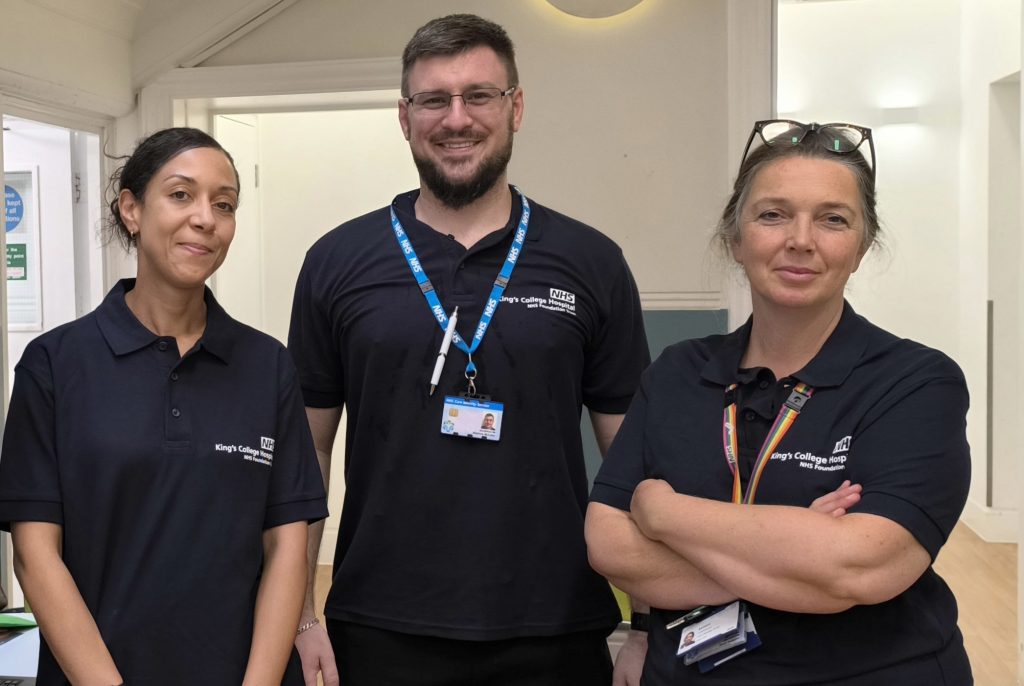Sickness to prevention
The 10 Year Health Plan aims to shift from a system focused on treating sickness to one that prioritises prevention, encouraging healthier lifestyles and early intervention. This involves making healthy choices easier, reaching patients earlier, and maximising opportunities to improve health during patient interactions.
Explore how this transformation is already taking shape across our region.
Overview
Study and findings
Clinical impact
- WB-MRI offers a standardised, non-invasive imaging method that can be deployed across cancer centres.
- The technique does not use ionising radiation or require intravenous injections, making it suitable for lifelong monitoring.
- By predicting relapse earlier than traditional imaging, WB-MRI enables clinicians to tailor treatment promptly and more effectively.
Professor Martin Kaiser, Consultant Haematologist at The Royal Marsden and Professor in Molecular Haematology at The Institute of Cancer Research London, said: “Access to this gold-standard precision imaging with WB-MRI has revolutionised care for myeloma patients. As treatment options increase and disease distribution becomes better understood, the relevance of WB-MRI for personalising treatment will only increase.”Professor Christina Messiou, Consultant Radiologist at The Royal Marsden, Professor in Imaging for Personalised Oncology at The Institute of Cancer Research London and Chief Investigator of the study, said: “This study shows that whole-body MRI gives us valuable information about how well the myeloma has responded to treatment that other tests may miss. It’s exciting that we now have a standardised, non-invasive imaging method that can be used across cancer centres. WB-MRI doesn’t involve radiation or intravenous injections, which is important for patients who may require lifelong monitoring. This is an important step towards smarter and kinder precision diagnostics for patients with cancer.”
Patient experience
He said: “With the constant threat of relapse, myeloma patients are in a long term mental battle with this insidious disease. Being part of the whole-body MRI scan study at The Royal Marsden allowed my cancer to be closely watched and resulted in me being treated sooner than I would have been under normal protocols. This not only extended my life but allowed me to continue serving my country in operational roles for many years.”
Support and partners
Overview
The need
- High genetic risk: Women with BRCA1 or BRCA2 gene alterations face substantially increased lifetime risks of ovarian cancer.
- Difficult choices: Preventative removal of ovaries and fallopian tubes remains the best option for risk reduction, but will lead to early menopause and loss of fertility when carried out before menopause.
- Evidence-based option required: NICE now recommends surveillance where women wish to delay surgery, creating demand for a reliable, clinically-proven monitoring pathway.
The solution
- ROCA Test surveillance: UCLH’s service uses the Risk of Ovarian Cancer Algorithm (ROCA) Test, a blood test that calculates personalised risk from changes in CA‑125 results combined with age, menopausal status, and BRCA status.
- Regular monitoring: Women offered surveillance undergo ROCA testing every four months to detect changes that signal rising risk.
- Integrated clinical pathway: Surveillance is delivered within the Familial Cancer Clinic at UCLH with tailored patient counselling, clear escalation routes for abnormal results, and follow-up planning for when patients decide to go ahead with preventive surgery.
Impact and evidence
- Reduced late-stage diagnosis: Clinical studies, including UKFOCSS and ALDO, show ROCA surveillance can cut late‑stage diagnosis of ovarian cancer by around 44%.
- Cost-effectiveness: Evidence from trials and implementation studies supports savings for the NHS by detecting disease earlier and enabling timely intervention.
- Patient choice preserved: The service gives high‑risk women a surveillance option if they choose to delay surgery while completing families or avoiding early menopause.
Professor Adam Rosenthal, Consultant Gynaecologist at UCLH, said: “Having pioneered the clinical trials in this area, we have reached a significant milestone in being able to offer ROCA surveillance for high-risk women in our NHS Familial Cancer Clinic.”
Next steps
The world’s largest deployment of AI in routine clinical-care: framework for delivery of the 3-shifts of the NHS 10-year plan applied to use of AI-stethoscopes for early detection of heart disease
In the largest randomised evaluation of AI in routine primary care, an AI-enabled stethoscope tested and developed by researchers at Imperial College London and Imperial College Healthcare NHS trust, is set to transform cardiac diagnostics.
The device uses artificial intelligence to detect three serious and common heart conditions in seconds helping clinicians make faster, more accurate decisions – it analyses tiny differences in heartbeat and blood flow undetectable to the human ear and eye, and take a rapid ECG at the same time.
The study (TRICORDER), funded by the National Institute for Health and Care Research (NIHR), the British Heart Foundation (BHF) and Imperial Health Charity, and supported by NIHR Imperial Biomedical Research Centre, involved more than 200 GP surgeries across London.
The AI stethoscope was trialled in 96 practices with 12,725 patients showing heart failure symptoms and compared with patients from 109 practices where the technology was not used. Results showed that when used as intended, the device was 2.33 times more effective in diagnosing heart failure within 12 months, 3.45 times more likely to detect atrial fibrillation, and almost twice as likely to spot heart valve disease.
By combining real-world but randomised use of the device this innovative study represents what is essential to drive The government’s essential 3-shifts mandated by the 10 Year Plan for the NHS and hailed by providers and patient groups as a “game-changer” for earlier diagnosis and treatment.
“This is an elegant example of how the humble stethoscope, invented more than 200 years ago, can be upgraded for the 21st century,” said Professor Nicholas Peters, Cardiologist and Director of the Health Impact Lab at Imperial College London. “By helping GPs identify heart disease in seconds, this technology offers patients earlier access to life-saving treatment, often before symptoms become severe. Demonstrating the benefits of real-world implementation of completely transformed clinical pathways is the real impact of the TRICORDER programme and the mission of The Health Impact Lab”
Dr Patrik Bächtiger from the Health Impact Lab recently presented the results of the study at the world’s largest cardiology conference, stating: “Unlike tightly controlled efficacy studies, TRICORDER was designed to mirror real-world practice. Providers used the device as they would in routine care, without prescriptive oversight.”
Dr Mihir Kelshiker, lead author on the upcoming TRICORDER study publication, added: “In demonstrating that widespread integration of AI at the point of care can uncover hidden cardiac conditions that might otherwise remain undiagnosed until hospitalisation or emergency care, TRICORDER represents a framework for delivering the governments 3-shifts.”
Heart disease remains a leading cause of death in the UK. Diagnosis often relies on specialist referrals and lengthy waits for echocardiograms, delaying treatment and increasing risk.
This AI-enabled stethoscope analyses heart sounds in real time, offering:
- Rapid results within seconds
- High diagnostic accuracy
- Ease of use for GPs and frontline staff
- Potential to reduce unnecessary referrals
Dr Sonya Babu-Narayan, clinical director at the British Heart Foundation and consultant cardiologist, said:“This is an elegant example of how the humble stethoscope, invented more than 200 years ago, can be upgraded for the 21st century.
“We need innovations like these, providing early detection of heart failure, because so often this condition is only diagnosed at an advanced stage when patients attend hospital as an emergency.
“Given an earlier diagnosis, people can access the treatment they need to help them live well for longer.”
These early trials show the tool can support earlier diagnosis, reduce pressure on specialist services, and improve patient outcomes.
Professor Mike Lewis, NIHR Scientific Director for Innovation, said: “This tool could be a real game-changer for patients, bringing innovation directly into the hands of GPs. The AI stethoscope gives local clinicians the ability to spot problems earlier, diagnose patients in the community, and address some of the big killers in society.”
Find out more on the Imperial College Healthcare NHS Trusts website or the British Heart Foundation website or Imperial’s Health Impact Lab .
News coverage:
- AI stethoscope could detect heart conditions in seconds – BBC News
- Doctors develop AI stethoscope that can detect major heart conditions in 15 seconds | Artificial intelligence (AI) | The Guardian
- ‘Game-changing’ AI stethoscopes could detect heart conditions in seconds | Science, Climate & Tech News | Sky News
North East London has launched a new three-year programme to provide preventative care for patients most at risk of needing unplanned emergency treatment.
The initiative, delivered in partnership with Health Navigator and UCLPartners, aims to identify and support people with long-term conditions such as asthma. By offering early intervention, the programme will help patients stay well and avoid hospital visits.
Using advanced AI screening technology, patients who are likely to benefit will be offered personalised, phone-based clinical coaching from healthcare professionals trained in preventative care and self-management techniques.
It is estimated that the programme will save 26,673 unplanned bed days across north east London, and potentially reduce A&E attendances by 13,000 each year.
Dr Paul Gilluley, Chief Medical Officer at NHS North East London, said: “More than 15 million people in England live with one or more long-term conditions, accounting for 50% of all GP appointments, 64% of outpatient visits, and over 70% of inpatient bed days.
“This new approach represents a landmark step in harnessing technology for preventative care to better support these patients before they reach crisis points.”
Shane DeGaris, Group Chief Executive at Barts Health NHS Trust, added: “As winter approaches, the pressure on A&E services is rising. By predicting demand and providing earlier interventions, we can improve patient outcomes and reduce the burden on the NHS.”
Dr Chris Laing, Chief Executive Officer of UCLPartners, said: “This project provides a template for how the NHS can use modern technology to deliver predictive, proactive and preventive care that is customised for local communities and prioritises those most in need of our help.
“Our collaboration with Health Navigator and NHS North East London will not only enhance the lives of at-risk patients but will also relieve critical pressure on our healthcare system too, aligning with the government’s prevention priority.”
Read more on the North East London Health and Care Partnership website.
Hundreds of patients in East London are set to benefit as the NHS opened its first 24/7 neighbourhood mental health centre – a key commitment under the 10 Year Health Plan – offering walk-in support for people with mental illness.
Tower Hamlets in East London is the first community to benefit as the NHS launches this trailblazing model of round-the-clock mental health support which will bring together a range of community mental health services under one roof, including crisis services, community mental health services and short-stay beds.
People with serious mental illness such as schizophrenia or bipolar will be able to walk in without an appointment if they need mental health support, as well as advice on employment, housing, or volunteering. Walk-ins are available from 8am-8pm Monday to Sunday.
The centre will be in the heart of communities and staffed by a team that includes psychiatrists, mental health professionals, peer support workers, and voluntary sector staff.
Patients will also benefit from having local authority, voluntary, faith and community sector organisations onsite at the centres, as well as people with lived experience offering support.
The new initiative is part of a wider effort to make sure mental health care is available when and where it’s needed, including the roll out of 24/7 psychiatric teams in every A&E and the world’s first 24/7 mental health crisis helplines across England, and dedicated mental health emergency departments for those in crisis.
 Imperial College Healthcare NHS Trust has launched a new NHS service for people living with dementia, offering remote, at-home monitoring that provides specialist support. It is hoped the service can lead to more appropriate interventions and earlier treatments for some of the most vulnerable people living in the community.
Imperial College Healthcare NHS Trust has launched a new NHS service for people living with dementia, offering remote, at-home monitoring that provides specialist support. It is hoped the service can lead to more appropriate interventions and earlier treatments for some of the most vulnerable people living in the community.
MinderCare uses a network of sensors installed in the home to send data back to a dedicated team of doctors, nurses and other clinical specialists. This team use the information to better understand how the person is managing their daily routine, provide tailored advice and identify early signs of changing health and care needs which may help reduce unnecessary hospital admissions.
Read more on the Imperial College Healthcare NHS Trust website.
A trust nurse at London North West University Healthcare is the first in the world to highlight the importance of using a skin tone card to spot the early warning signs of pressure ulcers and other skin damage among black and Asian patients.
Luxmi was puzzled why so many of her patients from ethnic minorities were presenting with late-stage ulcers that hadn’t previously been diagnosed.
In response, every healthcare assistant and nurse at the hospital trust has been issued with a skin tone card which shows a graduation of skin colours from light to dark helping healthcare professionals see if there is a potential problem.
Luxmi said: “Sometimes things are so obvious we overlook them. The combination of a lack of awareness and potential sensitivities around clinical staff querying skin tone discolouration means this has gone unnoticed.
“North west London has a very diverse community so the use of skin tone cards should be common practice. This is about providing a simple but effective visual tool that helps everyone.”
Luxmi’s work has seen her shortlisted for awards from The Nursing Times and Health Service Journal.
Read more on the London North West University Healthcare NHS Trust website.
A pioneering new way at St George’s Hospital treats heart failure like chemotherapy, providing optimal doses of medicines and giving patients the best balance between effectiveness and safety, without causing harmful side effects.
The new approach has cut heart failure deaths by two thirds and cut readmission rates by 30%, easing the pressure on other hospital services.
Matthew Sunter, Lead Heart Failure Nurse at St George’s, said: “Heart failure kills as many people as cancer, yet cancer treatments such as chemotherapy start faster.
“Now, armed with our new knowledge, we’re able to replicate this with heart failure patients, starting them on higher doses of medicines and increasing them much more quickly – in around three weeks, as opposed to several months.”
Read more on the St George’s University Hospitals NHS Foundation Trust website.
At West London NHS Trust, the Rough Sleeping and Mental Health Programme Team (RAMHP) work across Ealing, Hounslow, Hammersmith and Fulham supports people who are homeless to improve their health.
Steve Kirwin, Community Mental Health Nurse at West London, said: “The people we encounter can often be distrustful of services, as they have felt let down in the past. We check in to see how they are doing and if we can offer support. This ranges from a hot meal and a drink, to helping them to find a hostel or reminding them of appointments. For me, it’s important for them to know help is available.”
The teams’ collaborative work with multiple partners including Ealing Council is making a real impact. In a recently published government report: ‘Rough sleeping’ snapshot in England: Autumn 2024, Ealing Council ranked in the top five local authorities with the largest decrease in the number of rough sleepers.
The Waldron Health Centre and Community Hub has become a vibrant community space where residents can access clinical services, peer support groups and social advice under one roof. From mental health groups and diabetes care to midwifery and local advice services, the hub embodies how health and community support can come together.
Lewisham Mayor Brenda Dacres, who formally opened the hub said: “The Waldron has been a real cornerstone of our community since it opened in 2008, bringing lots of health and social care services together under one roof. The addition of the new neighbourhood community hub is important for all of us who care about health, wellbeing, and community here in Lewisham”.
Read more on the South East London website.
Older residents are being supported to stay healthy and independent through Functional Fitness MOTs delivered by Age UK Bexley and commissioned by the Bexley Wellbeing Partnership.
These assessments help people over 50 improve mobility, build strength and prevent future frailty.
Deborah Travers, London Borough of Bexley’s Associate Director of Adult Social Care & Health and Bexley Care Lead for the Frognal Neighbourhood said, “Supporting older people living with frailty is a Bexley priority given that 40% of residents are over 50 and 27.4% are estimated to have some form of frailty. Age UK aim to have completed Functional Fitness MOTs with 200 residents by the end of the year and are well on the way to doing so. Of those that have undertaken a first assessment, 92% report that they are more aware of what actions they can take to prevent falls, and 67% have started a new fitness activity as a result.”
The One Bromley health and wellbeing hub, located in the borough’s large town centre shopping centre, is an initiative by the One Bromley Local Care Partnership, which brings together health, care and voluntary services to work together in a more joined up way.
The hub offers a range of services targeting the five leading causes of poor health, known as the Vital 5. These services aim to help reduce the five leading causes of poor health in Bromley and focus on interventions and advice to support the management of:
- Blood pressure
- Smoking Cessation
- Alcohol use
- Common mental health problems
- Healthy Eating and Weight management.
Also on offer are essential services such as support for carers, befriending services, smoking cessation, and cost-of-living advice and support.
Dr Angela Bhan, Place Executive Lead for Bromley, said: “The hub offers such a vital range of services to help improve the health of our residents, especially those who are more likely to develop long-term health conditions. These services are designed to address both health and socio-economic challenges, which are often linked. For instance, stopping smoking not only improves physical health but also reduces financial strain. Similarly, cost-of-living advice can alleviate stress and improve mental wellbeing.”
Read more on the South East London website.
ShowerBox Barking, located at the Barking Learning Centre, is the UK’s first permanent shower facility for people experiencing homelessness. Funded by NHS North East London, the service was launched by Barking & Dagenham Council to provide access to hot showers, clean underwear, refreshments, and a safe, welcoming space to support hygiene and overall wellbeing.
With rough sleeping in the borough increasing by 64% between 2020/21 and 2022/23, this initiative directly responds to the urgent need for accessible sanitation. By improving hygiene, the service helps reduce health risks, prevent infection, and lower the need for hospital admissions.
The idea for ShowerBox Barking was shaped by earlier “Pop-Up” events, where individuals could access temporary showers, food, and medical care. Feedback from these events revealed a strong demand for more consistent hygiene support.
Barts Health NHS Trust have pioneered a fast, free cholesterol test, available at local pharmacies across east London. It is helping people catch hidden heart risks early — potentially preventing heart attacks and strokes.
Barts Heart Centre, working with UCLPartners, has introduced this seven-minute test — first launched in Newham — that shows your cholesterol levels and estimates your risk of heart problems over the next 10 years.
Jagjot Kaur Chahal, cardiovascular disease prevention lead pharmacist, said: “This quick test helps people find out if they’re at risk before something serious happens. Pharmacies are a convenient, trusted place to get checked and take control of your heart health.”
The service also connects people to support for healthier living, including advice on diet, exercise, and quitting smoking.
This is part of a wider approach at the Heart Centre, where clinicians are leading a bold shift from just treating disease to preventing it — helping people stay well and out of hospital. Prevention improves patient health and eases pressure on the NHS by reducing hospital admissions and costs.
Read more on the Barts Health NHS Trust website.
Read more on how 10-years-on the Barts Heart Centre, UK’s largest and busiest specialist heart hospital, is helping treat more patients and deliver better outcomes in an area of the UK with some of the highest rates of early deaths from cardiovascular conditions.
The Proactive Ageing Well Service (PAWS) is an innovative service in Lewisham supporting older adults with complex needs. PAWS’s focus is on early intervention for older adults living with frailty, a condition that affects one in ten people aged 65 and over.
In addition to older-persons, PAWS also proactively identifies those with learning disabilities and mental health conditions at a younger age who are more likely to develop frailty younger, setting up preventative measures early on to reduce the risk of health complications later on.
PAWS operates as a holistic and inter-connected service, centred around the Comprehensive Geriatric Assessment (CGA) which assesses seven key factors:
- Physical
- Socioeconomic/Environmental
- Functional
- Mobility/Balance
- Psychological/Mental
- Medication Review
- Advance Care Planning
The PAWS team then work closely with the person and their families (where appropriate) to develop a care plan that encompasses all of these factors as needed.
Since its launch in November 2024, PAWS has demonstrated measurable improvements in care, integration across services, and overall safety for older adults living with frailty. The initiative has enhanced person outcomes and contributed to the broader transformation of frailty care within the Trust.
Read more on the Lewisham and Greenwich NHS Trust website.
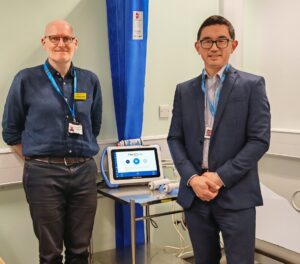 Guy’s and St Thomas’ NHS Foundation Trust has launched a new service to make liver scans more accessible for Lambeth residents. This service offers people with signs of liver disease a quick and convenient test called a Fibroscan.
Guy’s and St Thomas’ NHS Foundation Trust has launched a new service to make liver scans more accessible for Lambeth residents. This service offers people with signs of liver disease a quick and convenient test called a Fibroscan.
As part of a pilot scheme, eligible patients can now have their liver scans at their local GP practice instead of travelling to hospital. This makes it quicker and easier for patients to be seen, while also helping to ease demand on hospital services.
Jonathan Presky, a clinical nurse specialist at Guy’s and St Thomas’ who carries out the scans, said: “The aim is to try to identify problems early before they become more serious. Patients can also be seen very quickly.”
Terry Wong, the consultant liver specialist who leads the project, said: “For many patients being able to access this service in a GP practice is much more convenient.
“The service means that we can work in partnership with GP colleagues to make a real difference, as we detect, treat and improve care for local people with liver disease.”
Stephanie’s story below highlights her experience using this new community service.
Stephanie Andrews, a 53-year-old procurement manager, is one of hundreds of local people using this new community service.
Stephanie had previously been having ultrasounds every 6 months to monitor a small growth, known as a polyp, on her gallbladder. In 2023, an MRI detected additional lesions on her liver and pancreas, and she found that she was suddenly losing weight.
After contacting her doctors, Stephanie was offered a Fibroscan. This is a special ultrasound that checks whether there is any damage or scarring to the liver. If left untreated, this type of damage can lead to liver failure, which is a life-threatening condition.
Stephanie said: “I’m quite small anyway, so any kind of weight loss shows quite quickly. I’d lost about half a stone so they wanted to see if there was anything untoward going on.”
Through the new service, Stephanie was able to have a quick and convenient Fibroscan at the Akerman Medical Practice near Oval in Lambeth.
She said: “I was surprised because I received a text and was able to book an appointment for the Fibroscan the following day. The nurse, Jonathan, did the scan and gave me lots of feedback straight away, without having to wait for a letter or telephone call.
“I left there feeling a lot better mentally as some of my questions had been answered. And you get peace of mind, which is really helpful when you have any health concerns.”
People from African and Caribbean communities in South East London can now access free, quick and confidential hepatitis testing at weekly community drop-in sessions.
The new service, launched by King’s College Hospital NHS Foundation Trust in partnership with the Caribbean and African Health Network (CAHN), offers testing at Brixton Library and Lewisham Shopping Centre.
The King’s Viral Hepatitis Nurses team provide Hepatitis B and C testing, liver health checks for anyone who tests positive, and information and resources about hepatitis.
The initiative is designed to bring testing closer to communities at higher risk of Hepatitis B, supporting early diagnosis and access to care.
Kathryn Oakes, Clinical Nurse Specialist at King’s, said: “While community Hepatitis C testing has been available for a number of years, we are delighted to now be able to provide free and confidential Hepatitis B testing to local communities where we know there is an increased risk.
“With the right care and monitoring, people living with Hepatitis B can lead full and healthy lives. People born in Sub-Saharan Africa, East and South-East Asia, Eastern Europe and Central Asia, and South America or the Caribbean are more likely to have been exposed to the virus. The highest prevalence is in those born in Sub-Saharan Africa (up to 10%), so we are particularly keen to offer screening to people from these backgrounds.
“The hepatitis B and C viruses often do not have any symptoms, which means thousands of people are living with viral hepatitis without realising it. Not everyone with Hepatitis B requires treatment, but it is important that all patients with Hepatitis B receive the right care and monitoring. Hepatitis C can be cured with a short-term course of tablets. That’s why it’s so important to get tested and know your status.”

